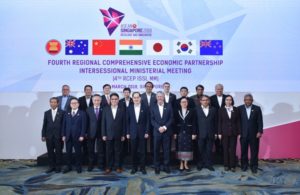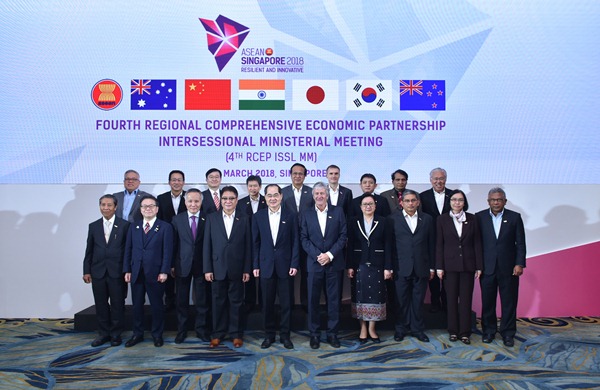 The trade and industry ministers of the 16 Regional Comprehensive Economic Partnership (RCEP) participating countries (RPCs) have reaffirmed their resolve to intensify efforts in 2018 to conclude talks on the regional grouping.
The trade and industry ministers of the 16 Regional Comprehensive Economic Partnership (RCEP) participating countries (RPCs) have reaffirmed their resolve to intensify efforts in 2018 to conclude talks on the regional grouping.
The ministers in a joint media statement issued March 3 during the fourth RCEP intersessional ministerial meeting held in Singapore welcomed the advancement of the text negotiations and noted that some chapters are nearing conclusion.
This is in addition to the two concluded chapters on Economic and Technical Cooperation and on Small and Medium Enterprises.
They also welcomed the work plan presented as part of the RCEP Trade Negotiating Committee Report to the Ministers.
Malaysia’s Ministry of International Trade and Industry Secretary-General Datuk Seri J Jayasiri confirmed to media after the meeting that some progress has been made towards a substantial conclusion by year-end, but conceded that “there are still gaps in many of the issues.”
Jayasiri expressed hope of further progress during the next two official meetings.
“And whatever [needs] political decisions, this will be taken [up] in the July RCEP Ministerial Meeting. Everybody is working towards substantial conclusion this year. There is political will to see movement in the RCEP negotiations,” said Jayasiri.
Asked whether RCEP is on track to be signed in November 2018, Jayasiri said: “There is no deadline. But we are all trying to see if we can make progress and get substantial conclusion by end of this year. It is not ‘they must finish by end of this year’. There is no such deadline. It is just there is a target to work towards a conclusion by end of this year.”
For this RCEP ministerial meeting, Jayasiri said it was to review progress, and to give guidance to the negotiators.
“So, there were certain guidelines and decisions that were adopted,” he said.
Elaborating further, Jayasiri said members were asked to improve on their goods offer, which is market access for goods.
By April 13, 2018, Jayasiri said, all negotiating parties would table a revised offer for trade in goods.
“And based on those revised offers, there will be requests and offers to improve the package. It is similar for the services and investment but there are no datelines,” he said.
He noted that members were asked to improve and revise their offers and also conduct request and offer negotiations.
Jayasiri said there would be a ministerial meeting in July 2018.
“This RCEP Ministerial Meeting is to be held before the ASEAN Economic Ministerial Meeting [AEM] in August 2018.”
“RCEP will also be discussed during the AEM. In between, there will also be two meetings of RCEP Chief Negotiators in April and June. This will be the process,” he said.
The joint statement said the ministers recognized the “divergence in the levels of ambition in some areas,” and tasked negotiators to work out creative, innovative and pragmatic landing zones to address the challenges and sensitivities faced by some RPCs, including those pertaining to the transition period and capacity building.
The ministers also welcomed progress made in the discussions on the tariff modality and its parameters, and the further intensification of the request and offer process.
On services, they instructed negotiators to continue resolving outstanding issues and improving offers across all modes of supply, while working together to address specific sensitivities faced by RPCs.
At the same time, the ministers expressed appreciation for the growing convergence among RPCs on the outstanding issues on investment and instructed RPCs to consider improving reservation lists.
The ministers reiterated the commitment to expedite negotiations on rules geared towards facilitating trade and investment in support of the expansion and deepening of regional value chains.
RCEP is a proposed free trade agreement (FTA) between the 10 member states of the Association of Southeast Asian Nations (ASEAN)—Brunei, Cambodia, Indonesia, Laos, Malaysia, Myanmar, Philippines, Singapore, Thailand, Vietnam—and the six states with which ASEAN has existing FTAs, namely, Australia, China, India, Japan, South Korea, and New Zealand.





